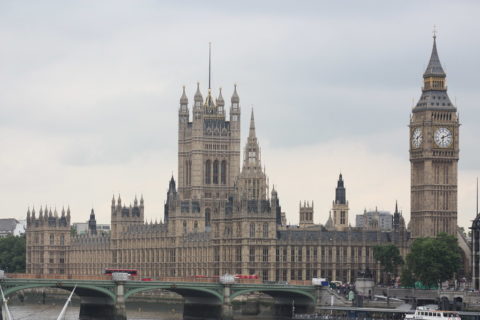Not surprisingly, even the less devout Moslems look on western civilisation with uncomprehending horror. They accept western technology and science, and envy western prosperity. But they largely reject the spirit of free inquiry, intellectual and practical, upon which the western ascendancy rests. Yasmin Alibhai, for example, has not only lived in England for several years, but also worked as a journalist for The New Statesman and Society. She is completely unable to understand how a nation with no taste for book burning and the murder of authors can be anything but a “moral chaos”. But the most explicit rejections come from the younger theorists of the Iranian Revolution. Majid Anaraki, who spent several years in southern California, sees the west as
a collection of casinos, supermarkets and whore-houses linked together by endless highways passing through nowhere. All that money, all that effort all those resources that are wasted so that idiotic women and shallow men can prolong their lives … You see ancient women who refuse to die at a normal time and who continue to paint themselves and crave youthful lovers right to the edge of the grave … To eat tons of hamburgers and popcorn, to imbibe oceans of Coca-Cola and whisky, to watch hundreds of hours of stupid television, to copulate mechanically a few hundred times, to be on guard minute against being robbed, raped or murdered. That is the American way of life.
Our civilisation is regarded as evil, and its destruction is taken as a sacred duty for reasons both defensive and offensive.
Defensive
There can be no doubt that Khomeini was a firm anti-communist. But, unlike the timid monarchies of the Arabian Peninsula, he saw quite clearly where the true threat to Islam lay. Throughout his reign, the Russians presented at least a potential threat to the northern borders of Iran, But this was as nothing to the actual ideological threat of the west, Marxism in Iran had converted its tens of thousands, and influenced its hundreds of thousands. But western civilisation — with its clothing fashions, its films, its music, its enshrinement of individual happiness, its secular knowledge — had captured its millions. There was a “Great Satan” devouring Islam; and its body was not communism, but the West; and its head was not Russia, but America, “We must break those pens” he wrote, “that teach people there is something other than divine law. We must smash those mouths that tell the people they are free to say whatever they please, regardless of right and wrong in accordance with the commands of the Almighty”. On this reasoning, to carry the fight from Iran, or wherever, into the west, is the equivalent of turning from the periphery to the centre of an infection.
Offensive
In one of his occasional attempts at humane argument, Khomeini justified a war of extirpation against the west on the following grounds:
If one allows the Infidels to continue playing their role of Corruptors on Earth, their eventual moral punishment will be all the stronger. Thus, if we kill the Infidels in order to put a stop to their [corrupting] activities, we have indeed done them a service. For their eventual punishment will be less.
For the most part, however, it is conversion to Islam that is desired of people in the west. Only those refusing to convert are to be slaughtered. In the first instance, all those areas of the world that were once Islamic, but have since been lost, are to be restored; and all those areas that contain sizeable Moslem minorities are to be Islamised. In 1982, a new map of the world was presented to Khomeini by the Cartological Society in Teheran. It was divided into three regions, distinguished by three colours. First, in green, came the House of Islam — this being the 41 member states of the Islamic Conference, together with soviet central Asia, southern Spain, Malta and Lampedusa, Albania, part of Yugoslavia, north eastern China, parts of Siam, Burma, the Philippines, and most of Africa. The remaining areas, the red and black, were divided between communism and the west. But the final state of affairs is to be a totally Islamic world. No part whatever is to be left in the hands of the “Cross worshippers”, as the Christians are contemptuously termed. Moslems in Great Britain at the moment comprise barely three per cent of the population. Nonetheless, “[t]hose Moslems” says Dr Shabbir Akhtar of the Bradford Council of Mosques, “who find it intolerable to live in a United Kingdom contaminated with the Rushdie virus need to seriously consider the Islamic alternatives of emigration (hijira) to the House of Islam or a declaration of holy war (jihad) in the House of Rejection. The latter may well seem a kind of hasty militancy that is out of the question, though, with Allah on one’s side, one is never in the minority. And England, like all else, belongs to Allah.
March 16, 2022
QotD: Muslim views of western culture
February 16, 2022
Germany’s dual economy during WW2 (and why Himmler would have succeeded Hitler if the Nazis had won WW2)
At Founding Questions, Severian looks at the way the Nazi economy was actually two entities — the “wartime” economy and the effectively separate SS economy under the control of Heinrich Himmler:
Here’s where the Nazis really blew it. “Nazism” should really be called “Hitlerism”, as it was a true cult of personality; there was no ideology without the specific individual man. That’s the tension at the heart of any collectivist ideology — somebody’s got to be The Boss, however temporarily — but Nazi Germany suffered it worse than most. Had the Nazis won the war, the bloodbath at the top would’ve been as spectacular per capita as the war itself. As thoroughgoing Social Darwinists, they only had one possible principle of succession …
Let’s provisionally call that the first consequence of an ideology in power: The personal is the political and vice versa. That seems trite, I realize, but I’m putting it here to emphasize its literalness – in an ideological state, building your own “affinity”, Bastard Feudalism-style, just IS politics. There’s no other possible political activity. And as much as the Nazis seemed to have screwed it up by going all in on the Fuhrerprinzip at the very top, their out-and-proud Organizational Darwinism (for lack of a better term) made them super-efficient at the lower levels.
Let’s bring Khrushchev back in. In many ways, he’s the Soviet Himmler. He was one of Stalin’s right hand men throughout the war, but somehow didn’t get tagged as a major player in the succession crisis until it was too late for all the other contenders for the purple to take effective countermeasures. In the same way, Hitler did announce a successor, sort of. In fact he did it twice: Before the war, it was Rudolf Hess; during the war, Hermann Goering. Neither of those guys had anything approaching the power Himmler had, but like Khrushchev, his personality was such that the other bigshots couldn’t help overlooking him. Just as the rest of the Politburo couldn’t wrap their heads around the idea of this uncouth quasi-Ukrainian peasant being a major threat, so the rest of the Nazi leaders couldn’t help seeing Himmler as this fussy little file clerk.
It’s a hell of a trick, and I’ll admit, I’m buffaloed. Even if Himmler (Khrushchev) was one hell of an actor, and the egos on the other top Nazis (Soviets) were gravity-defying, they still should’ve been able to see that this fussy little file clerk had some seriously hard boys working for him. Reinhard Heydrich was as ruthless a fuck as was ever born, and Himmler kept him in check. Ditto barbarians like Odilo Globocnik and Erich von dem Bach-Zelewski — they don’t come any nastier than those two, yet Himmler managed them easily. What other conclusion can you possibly draw about Himmler, other than that he was nastier than all of them put together? And yet, apparently, nobody did …
The only explanation for this that I can think of is the Nazis’ ideologization of governmental structures. As opposed to the Soviet experience, where the Party and the Bureaucracy were supposed to be, and often actually were, distinct. After some disastrous experiments with demoting technical experts to field hands, and vice versa, the Russian Communists learned that ideological correctness and “soviet power” does not, in fact, obviate the need for stuff like math. (See also: Mao’s backyard blast furnaces). So the Soviets made sure to separate what they called the “technical intelligentsia” from the Party. The head honcho at Gosplan, Gossnab, etc. would be a Party hack from way back, of course, but the actual brainworkers wouldn’t be. I don’t know just how many of them had Party membership cards, or if any of them did, but nobody I know of rose through the Party’s ranks via Gosplan.
Once a Gosplanner, always a Gosplanner. The technical intelligentsia got all kinds of perks in the Soviet system, but one thing they did not do was get perks inside the Party. You can be a technical expert, or you can be an up-and-coming Party man, but you can’t be both.
The Nazis did the exact opposite of that. The way the Third Reich actually functioned is still opaque in a lot of ways (especially to non-specialists), and of course the pressures of wartime forced a lot of ad hoc measures, but it seems like the SS was supposed to be a sort of All-Purpose Expert Corps. Not only did they have their own army and intelligence service, but they had their own economy — the brief history of the Third Reich makes a lot more sense when you realize that half or more of the official Reich economy was hamstrung by the informal but very real SS economy, operating largely (but far from exclusively) through the labor camps.
Indeed, the SS had their own administration. As incredible as it seems, the Nazis had no grand plan for what to do once they’d conquered Europe. Himmler did, at least as far as the East was concerned, and he tried his damnedest to put it into action in Poland (which is why the General Government was so legendarily brutal). Hitler apparently thought in terms of Germany’s lost late 19th century colonies, when he bothered to think about it at all … which wasn’t often. In his typical Fuhrer-riffic style, he just ignored the problem, trusting to Organizational Darwinism to sort it out …
… which is where the All-Purpose Experts of the SS stepped in. The General Government, for instance, was headed by a civilian lawyer, Hans Frank, but the day to day governance largely fell to the SS, because that’s who stepped up. Poland was an occupied zone, with vital war industries, but it was far behind the front for most of the war; the army couldn’t waste vital manpower garrisoning it. Thus the SSPF (the SS and Police Leader) stepped in, drawing manpower as needed from a wide variety of sources — the camp guards, the Wehrmacht (when garrison troops were available, and when they could wrangle them from the various army commanders), the civilian police, the “General SS”, and so on.
The details aren’t nearly as important as the big picture, which is: Unlike the technical intelligentsia in the Soviet Union, members of the SS could climb to the highest ranks of the Party. Indeed they were expected to: the SS was rapidly becoming a Party-within-the-Party at the outbreak of the war, not least because Himmler awarded a “ceremonial” SS rank to anyone who mattered politically in the various departments. The savvier guys refused the “honor,” of course, because they didn’t want to be subordinate to Himmler, even ceremonially, but many didn’t. Which meant that had the Nazis won the war, not only would Himmler have been the next Fuhrer, but the SS would’ve closed ranks, essentially taking over The Party — they’d be the Inner Party, as opposed to the “mere Nazis” of the Outer Party.
January 21, 2022
Conservatives versus the “Blob”
Sam Ashworth-Hayes is writing here about the British Conservative party, but just swap out the names and it’s equally applicable to the Canadian equivalent, and very likely true for the rest of the western world:

“Palace of Westminster”by michaelhenley is licensed under CC BY-NC-SA 2.0
The Conservative party is trapped in a nightmare of its own making. Number 10 is rocked by scandals, support in the polls is plummeting, the Northern Ireland Protocol (Chekhov’s car bomb) waits patiently for its return to the newscycle. As with every good nightmare, there is the sense of unease that something remains undone.
That something would be “conserving”. Set aside economic policy, where the Conservatives and Labour are still just about separable — although the new interest in higher taxes, spending and regulation is rapidly eroding this gap — and judge the period on the social axis: same-sex marriage, net migration at record highs, the march of progressive ideas through academia, business and press and into government speeches. You could be forgiven for thinking that Labour won the 2010 election, and every bout subsequent.
Why is that the Conservative party governs in such a fundamentally unconservative way? Part of the issue is that the average Conservative MP is, on social issues, basically indistinguishable from the average Labour voter, while the average Labour MP is to the left even of this. The centre of gravity in Parliament is well to the left of the general population.
A second part of the answer — and a partial cause of the first — is that the infrastructure of British politics is not designed for the right. When Michael Gove and his then-Special Advisor Dominic Cummings attempted to shake up the English education system in 2014, they found themselves publicly at war with what they termed “the Blob”: an amorphous conglomerate of civil servants, academics and unions that acted to gum up change and ensure stasis in the interests of its members. Rightwards reform is received as violent revolution, whilst the constant leftwards drift goes unremarked and unchallenged.
When Cummings made his way to Number 10, so did the concept of the Blob, expanded to include the BBC, various quangos, much of Whitehall and what is sometimes called “civil society”. The example of hate crime policy is illustrative of the general idea. The concept is not dissimilar to Curtis Yarvin’s “Cathedral”, or the Trumpian “deep state”. Critics of such accusations point out, not unreasonably, that coordinating so many constituent parts would be almost impossible — but this misses the point entirely. The purpose of a system is what it does, and individual elements responding to an ecosystem of incentives that produce given results can act in a remarkably coordinated way, when those incentives point in the same direction.
January 7, 2022
QotD: British intelligentsia and imperial decline
… the general weakening of imperialism, and to some extent of the whole British morale, that took place during the nineteen-thirties, was partly the work of the left-wing intelligentsia, itself a kind of growth that had sprouted from the stagnation of the Empire.
It should be noted that there is now no intelligentsia that is not in some sense “Left”. Perhaps the last right-wing intellectual was T.E. Lawrence. Since about 1930 everyone describable as an “intellectual” has lived in a state of chronic discontent with the existing order. Necessarily so, because society as it was constituted had no room for him. In an Empire that was simply stagnant, neither being developed nor falling to pieces, and in an England ruled by people whose chief asset was their stupidity, to be “clever” was to be suspect. If you had the kind of brain that could understand the poems of T.S. Eliot or the theories of Karl Marx, the higher-ups would see to it that you were kept out of any important job. The intellectuals could find a function for themselves only in the literary reviews and the left-wing political parties.
The mentality of the English left-wing intelligentsia can be studied in half a dozen weekly and monthly papers. The immediately striking thing about all these papers is their generally negative, querulous attitude, their complete lack at all times of any constructive suggestion. There is little in them except the irresponsible carping of people who have never been and never expect to be in a position of power. Another marked characteristic is the emotional shallowness of people who live in a world of ideas and have little contact with physical reality. Many intellectuals of the Left were flabbily pacifist up to 1935, shrieked for war against Germany in the years 1935-9, and then promptly cooled off when the war started. It is broadly though not precisely true that the people who were most “anti-Fascist” during the Spanish civil war are most defeatist now. And underlying this is the really important fact about so many of the English intelligentsia – their severance from the common culture of the country.
George Orwell, “The Lion And The Unicorn: Socialism and the English Genius”, 1941-02-19.
December 28, 2021
“After the Second World War, the architecture-industrial complex … began a massive rebuilding of major cities”
In The Critic, Nikos A. Salingaros decries “architectural urbanicide”:

Cumbernauld Shopping Centre, voted as Britain’s most hated building.
Photo by Ed Webster via Wikimedia Commons.
Biological life transforms energy from the sun into complexes of organic materials that either metabolize while remaining relatively fixed, or move about and eat each other. Human energy creates the analogous case of artifacts and buildings, which give us a healing effect akin to the feedback experienced from our interaction with biological organisms. This positive emotion corresponds to the mechanism of “biophilia”.
Women grow and nurture the human baby. They are predisposed to appreciate the created life form through an intense bond of love through beauty. Most people — though not all, a notable exception being the architect Le Corbusier — love babies and have a built-in reflex of smiling at the sight of one, even if it’s not their own. Beauty is inseparable from creation and life.
Established architecture in our times, and for a century before now, has been an almost exclusively male domain, dominated by sheer power. The profession has aligned itself with ideology and extractive money interests. A design movement that ignores living structure took dominance after World War II. It thrives through global consumption. Mathematical analysis can measure very precise living qualities embedded in design and materials, such as fractal scaling, multiple nested symmetries, color harmonization, organized details, vertical axis, etc. Recent experimental tools of eye-tracking and artificial intelligence using Visual Attention Software determine which designs attract the eye unconsciously, and which remain uninteresting to our sophisticated brain evolved for survival.
[…]
After the Second World War, the architecture-industrial complex of building and real estate industries began a massive rebuilding of major cities. This freed up real estate for new construction, an activity that enriched a certain section of society. Working with politicians at all levels, architectural review boards did not value traditional buildings, nor those in any of several new but non-modernist form languages. Any qualms about the irreversible destruction of the life of cities were offset by the media convincing the population that this was an inexorable and much desired move towards progress. Anybody opposing this program of architectural substitution — replacing living by dead structure — was labeled an obscurantist reactionary. The promised utopia seduced academia to join this campaign. People failed to realize that an ideology ostensibly linked to Marxist beliefs was driven by ruthless industry manipulation.
Nevertheless, architects don’t tear down buildings: it is real estate speculators who do. Those corporate entities are amoral, willing to do anything for profit. It’s not their responsibility to save valuable older buildings; that task falls upon society, which has failed miserably in this duty. The various mechanisms that are supposed to protect a perfectly sound and health-inducing building become a cruel joke when such a building is demolished. A decision is taken outside the light of public scrutiny, while implementing the strategy of the fait accompli — after the bulldozers and wreckers, it’s too late to do anything.
The story of the systematic destruction of the UK’s architectural heritage is long and ugly. To mention just one example, the corrupt Newcastle City Council Member Thomas Daniel Smith managed to erase large swaths of central city districts and replace them with cheaply-built glass-and-steel monstrosities before he was jailed in 1974. Smith worked closely with dishonest — and extremely successful — architect John Poulson, who was also jailed in 1974. He appealed directly to democratic and liberal sentiments to further his ambitions, and the political class at the time fell for his manipulations. This sordid story repeats, with only minor variations, except that the other urbanicides were never prosecuted.
November 5, 2021
“There is nothing to debate anymore. The climate catastrophe is coming. Now is the time for action”
Unlike all the other (dozens? scores? hundreds?) times since the 1970s we’ve been warned about imminent climatological disaster unless we gave up on industrial civilization, heating our homes, and all the other white supremacist, racist, colonialist, transphobic, etc., exploitations we have been enjoying up to now, we’re finally out of time and we must act NOW:
COP26 is an extravaganza of ideological conformity. From the 30,000 delegates and heads of state sequestered in the “blue zone” to the NGOs, academics and green businesses exhibiting in the public “green zone”, the message is the same. There is nothing to debate anymore. The climate catastrophe is coming. Now is the time for action.
Similar sentiments abound outside COP26, where the protesters are gathered. There the likes of young eco-millenarian Greta Thunberg also claim that the end is nigh, that the time for debate is over. Or as the Swedish teenager herself put it during a protest on Sunday, there’s no need for any more of this “blah, blah, blah”.
This is essentially what all those in and around COP26 are saying. That, in effect, there is nothing to debate anymore. And so, over the next few days, Western-led policymakers, angrily cheered on by protesters, will try to decide our futures for the next few decades. They will regulate, restrict and limit. And they will be able to do so without dissent or debate.
How have we got here? How have we ended up at a point where debating climate change has become nigh-on impossible? The answer lies principally in the use and abuse of the authority of science. The standard justification for shutting down those challenging the alarmist climate-change narrative amounts, effectively, to saying “the science has spoken”.
This was clear in the run-up to COP26, when Mark Lynas, a long-time environmentalist campaigner and now a visiting fellow at Cornell University, published a widely reported-on study asserting that the scientific consensus that humans are altering the climate is now agreed upon by 99.9 per cent of scientists. That’s how certain The Science now is. Not just 97 to 98 per cent certain, as it used to be, but 99.9 per cent certain. “It is really case closed”, said Lynas. “There is nobody of significance in the scientific community who doubts human-caused climate change.”
“Case closed.” No “doubts” and no appeal. These are revealing words. Climate change has long since ceased to be an issue to be addressed, or a set of challenges to be overcome. It is now the revealed truth, the God-like judgement around which we must organise the entirety of societal life. To question this truth is tantamount to apostasy. Hence Lynas calls for any remaining heretics to be censored, urging Facebook and Twitter “to look at their algorithms and policies” to root out “climate misinformation”.
Indeed, those daring to question any aspect of the alarmist narrative are now routinely dismissed not as heretics, but as “deniers” – a term which morally equates those who question, say, certain decarbonisation policies with anti-Semites who deny that the Holocaust happened.
September 12, 2021
Small signs of positive change in the culture wars?
Andrew Sullivan is hopeful that the small signs he mentions here are not just straws in the wind, but the beginning of a real reaction against “the Successor Ideology” among the ultra-woke cultural elite:
… both The Atlantic and The New Yorker have just published long essays that push back against woke authoritarianism and cruelty. Since both magazines have long capitulated to rank illiberalism, this is encouraging. And since critical theory is an entirely elite-imposed orthodoxy, it matters when the ranks of the elite crack a little.
Anne Applebaum links the woke phenomenon to previous moral panics and mob persecutions, which is where it belongs. She too begins to notice the obliteration of due process, individual rights, and mercy among her crusader peers:
Even if you have not been suspended, punished, or found guilty of anything, you cannot function in your profession. If you are a professor, no one wants you as a teacher or mentor (“The graduate students made it obvious to me that I was a nonperson and could not possibly be tolerated”). You cannot publish in professional journals. You cannot quit your job, because no one else will hire you. If you are a journalist, then you might find that you cannot publish at all.
Applebaum’s Atlantic piece is a good sign from a magazine that hired and quickly purged a writer for wrong think, and once held a town meeting auto-da-fé to decide which writers they would permanently anathematize as moral lepers.
Similarly, it was quite a shock to read in The New Yorker a fair and empathetic profile of an academic geneticist, Kathryn Paige Harden, who acknowledges a role for genetics in social outcomes. It helps that Harden is, like Freddie DeBoer, on the left; and the piece is strewn with insinuations that other writers on genetics, like Charles Murray, deny that the environment plays a part in outcomes as well (when it is clear to anyone who can read that this is grotesquely untrue). But if the readers of The New Yorker need to be fed distortions about some on the right in order for them to consider the unavoidable emergence of “polygenic scores” for humans, with their vast political and ethical implications, then that’s a step forward.
The profile also puts the following woke heresy into the minds of the Upper West Side: “Building a commitment to egalitarianism on our genetic uniformity is building a house on sand.” And this: “Genetic diversity is mankind’s most precious resource, not a regrettable deviation from an ideal state of monotonous sameness.” The New Yorker is also telling its readers that there are around “thirteen hundred sites on the genome that are correlated with success in school. Though each might have an infinitesimally small statistical relationship with the outcome, together they can be summed to produce a score that has predictive validity: those in the group with the highest scores were approximately five times more likely to graduate from college than those with the lowest scores.”
All of this is empirically true. But if this is empirically true, critical theory, which insists that absolutely nothing but white supremacist society leads to inequalities, is dead in the water. Refuted. Proven false by reality. Finished — even as it continues to be the premise of other countless pieces The New Yorker has run in the past few years. At some point, this will require a measure of rethinking, a moderation of the left’s absolutist blank-slatism just as the evidence is finally disproving it once and for all. The Successor Ideology, remember, holds that genetics play no role in human society, and that all inequalities are a function of the environment. Take that absolute claim away — which is to say to subject it to empirical testing — and it crumbles. And The New Yorker just took it away.
And then, in the better-late-than-never category, The Economist, the bible for the corporate elite, has just come out unapologetically against the Successor Ideology, and in favor of liberalism. This matters, it seems to me, because among the most zealous of the new Puritans are the boards and HR departments of major corporations, which are dedicated right now to enforcing the largest intentional program of systemic race and sex discrimination in living memory. Money quote: “Progressives replace the liberal emphasis on tolerance and choice with a focus on compulsion and power. Classical liberals conceded that your freedom to swing your fist stops where my nose begins. Today’s progressives argue that your freedom to express your opinions stops where my feelings begin.”
The Economist also pinpoints the core tenets of CRT in language easy to understand: “a belief that any disparities between racial groups are evidence of structural racism; that the norms of free speech, individualism and universalism which pretend to be progressive are really camouflage for this discrimination; and that injustice will persist until systems of language and privilege are dismantled.” These “systems of language and privilege” are — surprise! — freedom of speech and economic liberty. If major corporations begin to understand that, they may reconsider their adoption of a half-baked racialized Marxism as good management. Maybe that might persuade Google not to mandate indoctrination in ideas such as the notion being silent on questions of race is “covert white supremacy”, a few notches below lynching.
August 16, 2021
L. Neil Smith – “Take your children out of school!”
In the latest Libertarian Enterprise, L. Neil Smith offers a useful bit of advice to parents concerned about their children being indoctrinated in state-run schools:

“Abandoned Schoolhouse and Wheat Field 3443 B” by jim.choate59 is licensed under CC BY-NC-ND 2.0
For quite a while now, the boob-tube has been filled with coverage of various Board of Education meetings around the country attended by parents murderously angry that their kids are being forcibly indoctrinated with utter claptrap like CRT, which apparently stands for Communist Racist Toxin, a new and poisonous religion where the color of your skin is an Original Sin for which you will be made to suffer no matter what you think, do, or say. My wife Cathy, passing by the TV set half a dozen times a day, invariably shouts, “Take your children out of school!” This essay is admiringly dedicated to her.
I suppose the Public Schools got started out of some sense of specialization. “You chip the flint, Og, Ogla cooks the mammoth, and we’ll teach the kids.” Evolution would have it the other way. The young have been learning from their parents for thousands of generations and it worked out pretty well until sinister figures like Horace Mann and John Dewey, equipped with the limitless power of the State, decided to use it to steal our children from us.
Take your children out of school!
It was perhaps, the stupidest thing that a people have ever done, and I’m pretty sure that Thomas Jefferson would have recognized it as the stupid thing it was, so it had to wait until he and those like him were safely dead. It isn’t brain science. It isn’t rocket surgery. Hand your offspring over to the State, and they will be taught every self-destructive thing the State wants them to be taught — and by now it should be clear, as it surely was to Jefferson, that the State is the enemy of everything decent and productive. Public education was probably responsible for both world wars.
Take your children out of school!
And if it was such a self-evidently good idea, then why did it have to be compulsory? The rows of desks in public schools are populated by conscription — no matter how many pleasant memories we may have of our school days. Public schools are financed by extortion and theft, two of the reasons we fought a revolution in the first place.
Take your children out of school!
It might be cynically observed that public schools are cheaper than paying for baby-sitting, but, given property taxes and the damage it does to the most important people in our lives, is it really? Idiots have whimpered for the last year that having your kids at home is inconvenient.
Public Schools are convenient for the State. They give government two incomes to tax, instead of only one. Take your children out of school!
August 9, 2021
QotD: Leonid Brezhnev and his mother
In China, The Communist Party’s Latest, Unlikely Target: Young Marxists. “Young people who belong to Marxist groups have recently become the unlikely targets of a state crackdown due to their zeal to help educate and mobilize China’s working class to fight for their rights. The conflict has exposed a paradox between a party founded on Marxist principles and the very young people it has tasked with carrying those principles out.”
It’s not really a paradox. Communism is just a con. When the true believers get in the way of the con, they have to be shut up.
The old Soviet joke went like this: General Secretary Brezhnev shows his mother his palatial apartment in Moscow, his fancy dacha in the countryside, his chauffer-driven limousine, his personal helicopter, etc. and says “See mom, I’ve really made it. Aren’t you proud?”
“Very much so,” she says. “But I’m worried, too.”
“What are you worried about?” asks Brezhnev.
“Well, Leonid — what if the communists come back?”
Glenn Reynolds, “This Reminds Me Of The Old Soviet Joke About Leonid Brezhnev And His Mother”, Instapundit, 2018-11-24.
July 23, 2021
QotD: Cultural Marxism includes a form of reverse Nazism
While the neo-Marxism (or cultural Marxism, as some call it) is same shit, different assholes, it also represents a sort of a reverse Nazism. Where under the original Nazism, the Aryans were the master race of supermen, with all the other races inferior, and some (like Jews) not only inferior but positively dangerous and evil, now it’s the “whiteness” that is irredeemably tainted and the source of everything that is wrong with the world. If that sort of a Manichean world-view filled with hateful racialist (and increasingly eliminationist) rhetoric worries you, there is no need to – after all, the people who hold such opinions are “anti-fascists”.
There is nothing new under the sun, just the same old zombie ideas that refuse to die. Whether the old or new Marxism, the activists have the same simplistic, blinkered view of life and the same radical solutions. The irony in both cases is that their ideology reaches its peak popularity after the genuine grievances that gave rise to it in the first place have by and large been confronted and addressed. No matter. In the twentieth century, Marxists failed to replace liberal capitalist democracy with their utopia; in the twenty-first, they are trying their luck again. This time it will be “real” socialism, rainbows and unicorns and happily ever after. This time it will be different.
Arthur Chrenkoff, “Why everything is racist”, Daily Chrenk, 2021-04-13.
July 12, 2021
QotD: Führerprinzip
All revolutions bring out the weirdos, of course, and go through purity spirals, and the rest, but the English, American, French, and Bolshevik revolutionaries had a clear, universalizing ideology — a coherent worldview, a real body of doctrine, hashed out in hard debates among serious thinkers. The Nazis were a lot more intellectual, and more ideological, than they’re given credit for, but they were unique in their ideological commitment to Führerprinzip, the “leader principle.” Such that while, say, Communism in practice ended up being “whatever Comrade Lenin says it is,” Nazism started out that way.
Because of this, it was easy to “project” onto Hitler. It was one of the keys of his appeal. When he talked about “international finance capital,” for instance, he often meant “Jews” … but often he didn’t, and even when he did, you could fairly easily convince yourself that he didn’t. Same with his other big bugbear, “Jewish Bolshevism.” Was he primarily an anti-Semite, or an anti-Communist? You could convince yourself either way — that the part you didn’t like was just a personal psychological quirk of Hitler’s, while the part you did like was “true Nazism.”
Unlike the Bolshies, then, or the French or even American and English revolutionaries, you really didn’t know what Hitler and the boys would do once they were in power. You knew it wasn’t going to be sunshine and roses for the folks in tiny hats, of course, but you could very easily convince yourself that stuff was only a small part of Hitler’s program. So much really depended on one man’s psychology.
Which fed into the other big ideological pillar of Nazism, Social Darwinism. The Nazis weren’t the hyper-organized, hyper-efficient monsters of popular imagination. Their org charts looked like plates of spaghetti, by design. Indeed it was often hard to tell who, exactly, was in charge of what — again, by design. Just to take one prominent example, Heinrich Himmler was, in his capacity as head of the German Police, nominally subordinate to the interior minister, Wilhelm Frick … but as head of the SS he controlled a much more powerful organization, and he used it to split the police into several bureaus (Orpo, Kripo, etc., for the specialists), which were then amalgamated into the Reich Main Security Office. Plus, guys in the various police organizations also held SS rank…
All of this, again, was explicitly ideological. As Social Darwinists, the Nazis wanted the various groups to fight it out, letting the most talented (and, needless to say, ruthless) guys rise to the top. Power was wielded by whomever seized it, in whatever capacity. Again, you had Adolf Eichmann running the entire Reich’s transport network in the darkest, most desperate part of the war … and he was a lieutenant-colonel. Not even an Army LTC; he only held rank in the SD, the secret police.
In practice, then, you had little islands of authority. The guys in charge were all freelancers, advancing The Cause however they saw fit, with whatever tools they had to hand. SA guys (brownshirts, “storm troopers”) and SS guys were always locked in conflict with each other; inside the SS, the “general SS” lost out to the SD, all of whom were backstabbing each other. The Wehrmacht and the Waffen-SS were always stomping on each other in the field, constantly squabbling over equipment, manpower, areas of responsibility … even the occupation governments were a mess, with some functions falling to the Army, some to the HSSPF (the parallel SS/SD adminstration), some to the Waffen-SS, some to the Einsatztruppen, and all with the approval of the head honchos, which is why e.g. Poland (the “General Government“) was such a mess … and why such comprehensively awful shit happened there (when you’ve got SOBs on the order of Hans Frank and Odilo Globocnik competing to out-asshole each other, it’s really, really bad).
Severian, “AMA Response: Revolutions”, Rotten Chestnuts, 2021-02-10.
June 6, 2021
George Orwell’s “Politics And The English Language” remains the best guide to writing non-fiction
Despite pulling most of his writing behind a paywall, I still get the occasional “Weekly Dish” post excerpt from Andrew Sullivan, including his homage to the still-relevant Orwell essay “Politics and the English Language”:
From time to time, I make sure to re-read George Orwell’s classic essay, “Politics And The English Language“. It remains the best guide to writing non-fiction, and it usually prompts a wave of self-loathing even more piercing than my habitual kind. What it shows so brilliantly is how language itself is central to politics, that clarity is as hard as it is vital, and that blather is as lazy as it is dangerous. It’s dangerous because the relationship between our words and our politics goes both ways: “[The English language] becomes ugly and inaccurate because our thoughts are foolish, but the slovenliness of our language makes it easier for us to have foolish thoughts”. We create language and language creates us. If the language is corrupted, so are we.
Near the end of the essay, Orwell lists a few rules to keep writing clear, accessible and meaningful:
i. Never use a metaphor, simile or other figure of speech which you are used to seeing in print.
ii. Never use a long word where a short one will do.
iii. If it is possible to cut a word out, always cut it out.
iv. Never use the passive where you can use the active.
v. Never use a foreign phrase, a scientific word or a jargon word if you can think of an everyday English equivalent.
vi. Break any of these rules sooner than say anything outright barbarous.
Originality, simplicity, brevity, active verbs, everyday language, decency: as simple as it is very, very hard. It’s a relief in a way to recall that Orwell thought things were pretty damn shitty in his day as well, but the more you read broadly across most elite media platforms these days, the more similar it all sounds. To reverse Orwell’s virtues: so much of it is repetition, complexity, length, passive verbs, endless jargon, barbarism.
I was just reading about the panic that occurred in the American Medical Association, when their journal’s deputy editor argued on a podcast that socio-economic factors were more significant in poor outcomes for non-whites than “structural racism”. As you might imagine, any kind of questioning of this orthodoxy required the defenestration of the deputy editor and the resignation of the editor-in-chief. The episode was withdrawn from public viewing, and the top editor replaced it with a Maoist apology/confession before he accepted his own fate.
But I was most struck by the statement put out in response by a group called “The Institute for Antiracism in Medicine”. Here it is:
The podcast and associated promotional message are extremely problematic for minoritized members of our medical community. Racism was created with intention and must therefore be undone with intention. Structural racism has deeply permeated the field of medicine and must be actively dissolved through proper antiracist education and purposeful equitable policy creation. The delivery of messages suggesting that racism is non-existent and therefore non-problematic within the medical field is harmful to both our underrepresented minoritized physicians and the marginalized communities served in this country.
Consider the language for a moment. I don’t want to single out this group — they are merely representative of countless others, all engaged in the recitation of certain doctrines, and I just want an example. But I do want to say that this paragraph is effectively dead, drained of almost any meaning, nailed to the perch of pious pabulum. It is prose, in Orwell’s words, that “consists less and less of words chosen for the sake of their meaning, and more and more of phrases tacked together like the sections of a prefabricated hen-house.”
It is chock-full of long, compounded nouns and adjectives, riddled with the passive voice, lurching and leaning, like a passenger walking the aisle on a moving train, on pre-packaged phrases to keep itself going.
Notice the unnecessary longevity: a tweet becomes an “associated promotional message”. Notice the deadness of the neologisms: “minoritized”, “marginalized”, “non-problematic”. As Orwell noted: “the normal way of coining a new word is to use a Latin or Greek root with the appropriate affix and, where necessary, the -ize formation. It is often easier to make up words of this kind (deregionalize, impermissible, extramarital, non-fragmentatory and so forth) than to think up the English words that will cover one’s meaning.” Go back and see if you can put the words “minoritized” or “non-problematic” into everyday English.
Part of the goal of this is political, of course. The more you repeat words like “proper antiracist education” or “systemic racism” or “racial inequity” or “lived experience” or “heteronormativity”, the more they become part of the landscape of words, designed to dull one’s curiosity about what on earth any of them can possible mean. A mass of ideological abstractions, in Orwell’s words, “falls upon the facts like soft snow, blurring the outlines and covering up all the details.”
Then this: “Racism was created with intention.” Abstract noun, passive voice, vague meaning. Who “created” it? What was the intention exactly? Hasn’t racist tribalism been a feature of human society for tens of thousands of years? They never say. Or this phrase: “purposeful equitable policy creation”. Again: what are they talking about? It is as vague as “doing the work” — and as deliberate as the use of a highly contested term like “structural racism” to define objective reality. These are phrases not designed to say anything real. They are phrases designed to send a message of orthodoxy, and, as Orwell also noted, “orthodoxy, of whatever colour, seems to demand a lifeless, imitative style”. Try reading Slate or Vox or the Huffington Post: the tedium you feel is the tedium of a language rendered lifeless by ideology.
April 16, 2021
March 10, 2021
How wide is the gap between extreme partisanship and sectarian violence?
Sarah Hoyt says she really didn’t want to write this post, and I completely understand why she feels that way:
The next American Civil War will be fought in a lot of places, in sudden flare ups and unexpected bursts of rage. But where most casualties will occur is in the home.
America’s civil war will be fougnt many places, but mostly in living rooms: siblings against each other, parents against children, children against parents, husband against wife, wife against husband.
If you live with a convinced leftist, how safe is your life, should the balloon go up?
And before you say “The first civil war was also between brothers!”
Sure, it was. There were mixed families. Mostly upper crust mixed families. But the war was largely a regional war, the country riven on regional lines.
Now? Bah. Now it’s a war of ideology. A war of beliefs.
And a lot of people are sleeping with the enemy, hanging out on weekends with the enemy. Visiting the enemy. Having lunch with the enemy.
At this moment a lot of you are sitting back there and going “My wife/husband/elementary school friend is not an enemy. Sure, he/she/it drank the Marxist koolaid from a hose but in every day life, in our normal interactions, in non-political things, we are very close, the best of friends.”
And maybe you are. Maybe you can trust them with your life.
But I will remind you we live in a nation where the capital is surrounded with razor wire to defend themselves from people who voted for the guy. I will remind you there are troops occupying our capital and that our secret services have so far been corrupted they keep inventing internet conspiracies (or probably referring to their very own black ops) to justify it.
I will remind you that your favorite progressive has allowed himself to be moved from “strong welfare net” to “we need full on communism, with favored races” within the last 12 years (or was indoctrinated into that state in schools.) I will remind you — and the conversations related back to me don’t help me think otherwise — that your favorite leftist thinks you’re racist/homophobic/evil. NO MATTER HOW MANY indications to the contrary.
And I can hear you sniffling: “But I love him/her/it/fuzzy.” Well, yes, and ten years ago that would have been me. I had very good friends I just classed as political idiots. I don’t wish the last 10 years on anyone, but at least they’re not living with me, 90% of them don’t know where I live. And I’ll be out of here in hopefully no more than 4 but maybe ten months, and maybe we have that long. Also, most of my close friends/acquaintances aren’t likely to cause any damage, being … not the type. On the other hand two dozen of them (easy) are friends with people who WILL.
Now to be clear: do I expect all of you in mixed political families to be in danger?
No. Any number of your spouses, relatives and friends are leftist because that’s “what good people are.” And they will turn on a dime, too, if half the crap about what the left has been doing for the last couple of decades comes out unvarnished and unspun. (The left knows it too. They’re perhaps more scared of these people than they are of us.)
Others are leftist and might hate your guts if things go hot, but simply don’t have it in them to hurt anyone. These are the “slippery” ones, because if you had asked me, even two years ago, if the media and the left (BIRM) could spin these people into wishing death on someone for not wearing a mask, when the person is not sick; there’s no proof of asymptomatic transmission (there’s reports from China but NOWHERE ELSE); and the actual disease (it’s not hard to find) might be a little more lethal than the flu but only at ages past about 80, I’d have said “no. They’re politically insane, but not stupid.” However they are “group oriented.” Turns out the type of gaslighting we’ve been enduring works really well on people who live for others’ opinions. (Which explains whey Southern Europe is still mired in the fricking crazy. Uniformly. And why women in general are more susceptible to the completely irrational gaslighting than men.) And they already believe a bunch of crazy crap. The reason that they think QANON is right main stream, it’s because it’s the mirror image of their actual main stream.
Are you sure they’ll remain inoffensive if the ballon goes up and the gaslighting switches to “If you know a Trump voter, he/she is dangerous?” How about “Turn them in, so they can be sent somewhere nice for their own protection?”
Look, guys, I hope none of this is ever needed. I still have friends on the other side, I’m just not in touch and we work on the very long finger. And there are people I no longer consider friends but whom I like very much who are buying into the entire insane bull excreta of “attempted coup” and evil “white nationalists.”
But like Peter Grant, I think we’re way past the ballot box, and just waiting for a precipitating incident.
I desperately hope she’s wrong about this, because an actual shooting war in the United States would be a disaster for western civilization.
Update: It’s apparently time to Immanentize the Eschaton!
I’m of the firm opinion that the Progressive Left believed that once Obama won his second term they were set. The eschaton night not be immanent, but it was imminent. Hillary was going to be another “great leap forward” towards the heaven on Earth promised by Karl Marx. […]
“Politics” it is said, “is the art of compromise.” “War,” said von Clausewitz, “is politics by other means.” I have repeated and repeated the observation that has made itself manifest in the nearly 18 years I’ve been writing this blog: Charles Krauthammer noted in 2002 that “To understand the workings of American politics you have to understand this fundamental law: Conservatives think liberals are stupid. Liberals think conservatives are evil.”
You don’t debate with evil. You don’t negotiate with evil. You don’t compromise with evil. You don’t tolerate evil. You DESTROY evil. You pat it on the head until you can find a rock big enough to bash its skull in.
And control of the culture, education, and the government makes for a big damned rock.
Here’s the tinfoil yarmulke part of this essay: The preparations are underway. When debate and compromise are no longer possible, then force is the only thing left. They know it, and they’re projecting it on their enemy, us.
The Progressive Left has created and exercised its Sturmabteilung (yes, I know I risk Godwinization, and they loathe such comparisons, but this one’s apt. Their outfits are black instead of brown, but the actions are the same.) They’ve been set loose in the Pacific Northwest and some other cities and have been allowed to riot, commit arson, loot and occasionally murder with little to no legal consequence (violence, after all, being free speech you know.) Andy Ngo has studied Antifa, itself with roots in radical Socialism, in depth, and says that they are preparing for war, generously supported by the more mainstream Progressive Left. Black Lives Matter, an organization founded by two open Marxists, is also part of the preparations, but these are in my opinion just the Progressive Left’s “useful idiot” shock troops – the first to go against the wall after the Revolution.
February 24, 2021
Solzhenitsyn was far from the first to warn about the evils of Soviet rule
Theodore Dalrymple had a discussion recently with a Marxist professor:

Krushchev, Brezhnev and other Soviet leaders review the Revolution parade in Red Square, 1962.
LIFE magazine photo by Stan Wayman.
The professor was an intelligent man, and probably cultivated too. How was it possible, in the Year of Our Lord 2021, for such a person still to believe that, until the advent of Stalin, the Russian revolution was a good thing, to be emulated or repeated elsewhere?
How could anyone of his intelligence fail to realise that, though as ever there was much wrong with the world, attempts to put everything right at once by the implementation of petty intellectual schemes are fraught with danger, and have a history of mass slaughter behind them?
I think the answer must lie in the psychology of religion: when religious faith is replaced by a philosophy that prides itself on its rationality, it soon turns religious in the worst possible sense. it becomes an atheist theocracy.
Everything was known about the Soviet Union from the first. It is simply not true that Solzhenitsyn revealed anything to the West that, in essence, was not, or could not have been, known before.
I have, in desultory fashion for a number of decades, been collecting books about Russia and the Soviet Union from just before the Revolution until the Second World War, and while it is true that many of them are laudatory, with titles that now seem hilarious to us such as The Soviet Union Fights Neurosis, a very large number books of various genres, from essays to histories to memoirs to novels and short stories, were published that exposed the viciousness of Bolshevism from the very first — a viciousness that anyone with any imagination could have anticipated from Lenin’s literary style alone.
Leninist viciousness was viciousness of a new and more thoroughgoing type that acted on the mind as a virus acts on a computer (viciousness, both actual and potential, is, alas, a constant of human history because of our flawed nature).
Solzhenitsyn was right about the difference between Macbeth, who from personal ambition killed people, but only a few, and the ideologically-motivated mass-killings of the Soviet Union and elsewhere — the difference being precisely in the effect of ideology.
But what was really different about Solzhenitsyn, apart from his literary talent, was that Western intellectuals were now prepared to believe what he said, whereas shortly before they had rejected as mere propaganda evidence of a very similar nature produced by others.It was so startling to meet someone who still believed that a “pure” revolution could take place, and that such a person was teaching history of all things, in a reputable, or at any rate reputed, university, that, like Karl Kraus confronted by Hitler, I could think of nothing to say.
I had no idea whether he still taught undergraduates, or whether in doing so he suppressed at least some of his views (as a judge is supposed to suppress his own private opinions): but I confess that the charge against Socrates, that of corrupting youth, came into my mind.









